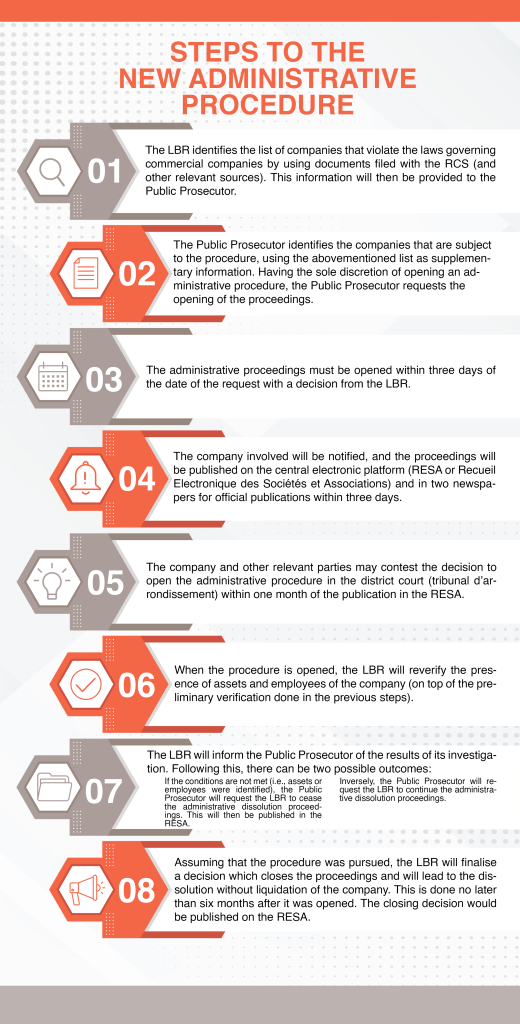A brief overview of the new Administrative Dissolution Procedure in Luxembourg
DISCLAIMER: This post was last modified on 27 October 2022. Some information in this article may not be updated.
Earlier this year, the Luxembourg parliament introduced the latest draft of Bill No. 6539B. The draft bill 6539B is a part of the original bill of law, Bill No. 6539 otherwise known as the “Insolvency Bill.”
In the latest update, Bill No. 6539B was passed on October 18, 2022. The Luxembourg parliament passed the law allowing for an administrative dissolution procedure without liquidation.
In this article, we go into detail about the new law and administrative dissolution procedure for Luxembourg entities.
Bill No. 6539B
The considerations and observations made during numerous bankruptcy proceedings in Luxembourg paved the way for the introduction of the administrative dissolution without liquidation proceedings.
Prior to Bill No. 6539B, the Public Prosecutor (Procureur d’état) can request an order to the dissolution and liquidation (also known as the Judicial Liquidation Procedure) of a Luxembourg company, if proven to have executed a serious offence. Accordingly, the court will appoint liquidators to decide on the liquidation procedure.
However, this provides for a costly and time-consuming administrative burden on the Luxembourg courts. The Luxembourg state shells out the expenses and fees of liquidators if it involves inactive companies with no or insufficient assets, which are also known as “empty shell” or “zombie” companies.
This is where Luxembourg’s new Administrative Dissolution Procedure — administrative dissolution without liquidation — comes in.
Objectives and the Advantages
The new Administrative Dissolution Procedure mainly addresses the issue of a costly and inefficient process of dealing with dormant and empty companies in Luxembourg. It simplifies and accelerates the dissolution process of Luxembourg companies and alleviates the burden imposed on the courts to administer the Judicial Liquidation Procedure.
Moreover, the new and simplified administrative dissolution process plays an important role in combating money laundering and the financing of terrorism. The new legislation facilitates the dissolution of empty companies that can be used for illegal and criminal purposes, especially in instances when regulation is lacking.
That being the case, the administrative dissolution procedure is aimed to strengthen the position of Luxembourg as a financial centre by fostering investor and stakeholder confidence in the Luxembourg market and modernising such processes.
Scope and Exceptions
The legislation applies to all companies, however, they should meet three cumulative conditions before being subject to the procedure at the request of the Public Prosecutor:
- Absence of employees. The process would otherwise be more complicated since there could be a risk of claims from the existing employees.
- Absence of assets. This will be confirmed by the Luxembourg Business Registers (LBR) through the Luxembourg Register of Commerce and Company (RCS or Registre de Commerce et des Sociétés).
- Falls within Article 1200-1, paragraph 1, of the amended Luxembourg Commercial Companies Act. The act is also known as the amended Law of 10 August 1915. Article 1200-1, paragraph 1, of the act pertains to companies that are involved in activities that are in violation of the provisions of the Commercial Code or criminal laws governing commercial companies.
The process of administrative dissolution without liquidation does not apply to organisations subject to prudential supervision.

How Bolder Group assists
With the Grand Duchy’s growing financial scene and the government’s efforts to improve existing legislation, laws that would affect the players in the financial market should be expected. Bolder Group has a team of knowledgeable professionals ready to help you with your corporate needs.
Contact our Luxembourg office to know more.
Bolder Group does not provide financial, tax or legal advice and the information contained herein is meant for general information purposes only. We strongly recommend that before acting on any of the information contained herein, readers should consult with their professional advisers. The Bolder Group accepts no liability for any errors or omissions in the information, or the consequences resulting from any action taken by a reader based on the information provided herein.
Bolder Group refers to the global network of independent subsidiaries of Bolder Group Holding BV. Bolder Group Holding BV provides no client services. Such services are provided solely by the independent companies within the Bolder Group which are each legally distinct and separate entities and have no authority (actual, apparent, implied or otherwise) to obligate or bind Bolder Group Holding BV in any manner whatsoever. The operations of the Bolder Group are conducted independently and have no affiliation with third party financial, tax or legal advisory firms or corporations.
